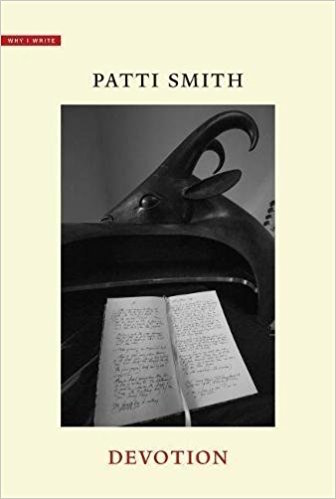Book Review: Patti Smith’s “Devotion” — Not Devoted Enough
The short volume promises a glimpse into Patti Smith’s intuitive creative process — but disappoints.
Devotion by Patti Smith. Yale University Press, 112 pages, $18.
By Matt Hanson

Ever since she blazed onto the scene with her galvanizing 1975 debut Horses, and kept up the pace with the incantatory Easter, Patti Smith has made a brilliant career out of mixing avant-garde poetics with primal rock n roll. In concerts she would finish her fiery cover of The Who’s “My Generation” by exasperatedly shouting “I’m so young! I’m so goddamn young!” which meant, in a witty contrast to the song’s famous kiss-off line, that evidently she very much hoped not to die before she got old. Luckily for all of us, Patti got her wish.
Her inspiring 2010 memoir Just Kids made reminiscing about ’70s era New York City bohemia sound fresh and thrilling again, quite a trick after it had been done to death in a million songs, movies, and TV shows. The National Book Award she won for the volume reinforced her stature as a revered literary figure. She has been featured in art exhibits around the world and sang “A Hard Rain’s A- Gonna Fall” at Bob Dylan’s Nobel Prize ceremony, since the man of the hour evidently had something else going on that night. After decades of well-received records and books of poetry, Smith has deservedly gone from being an enfant terrible to an eminence grise.
Her new book Devotion, the first in Yale University Press’s Why I Write series based on Yale’s prestigious Windham-Campbell Lectures, purports to be “an intimate account of her own creative process.” This is intriguing because Smith has never been one to make her art easily digestible. I can’t be the only long-time fan who is genuinely curious if she ever feels a twinge of regret over writing, for example, a song like “Rock and Roll Nigger.” Unfortunately, Devotion, with its graceful cover photo and promise of a look at Smith’s intuitive creative process, is disappointing from the title on down — for all its overblown language, artistic reverence, and pseudo-revelatory style. Devotion just isn’t devoted enough.
The book’s brisk 93 pages are divided into three sections, with two brief first-person accounts of her European travels framing a long, dreamlike, and rather tedious short story. The first section is called “How the Mind Works” which doesn’t so much describe how “the” mind works, or how Smith’s mind works, but provides a fly-on-the-wall glimpse into her day-to-day routine, in this case a trip to Paris on behalf of her French publisher. She describes randomly seeing the trailer for a movie about Estonians sent into exile in Siberia and how it sort of haunts her, or something: “Yet returning to the same bit of film I had viewed earlier, I find no such scene. Had I unwittingly projected it? I push aside my computer and cast a ruling upon the uneven plaster ceiling: we pillage, we embrace, we know not. I get up to urinate. I imagine snow.” Um, thanks for sharing?
Then there’s her slightly overblown way of describing routine annoyances: “The taxi arrives too quickly as I realize I haven’t yet chosen what books to take.” Don’t you hate it when that happens? “The prospects of boarding a plane without a book produces a wave of panic.” Don’t worry Patti, you got this. “I desperately scan the room as if searching for a lifeline in a deep marsh.” And, wonder of wonders, she pulls herself out of this dreadful abyss by grabbing a couple of unread tomes (Simone Weil and Patrick Modiano) from the nightstand and then it’s off to Paris.
Most of the book’s first section describes Smith’s listless encounter with her Parisian publisher Gallimard, where she obliquely refers to conversations with journalists and takes a trip through the august publisher’s headquarters to do some high-culture tourism, seeing the place where Yukio Mishima once sat, the room where Camus once had an office, and tour a garden that only reminds her of OTHER gardens, including one where “Goethe was said to have planted a gingko tree.” We hear about her mornings at the Café de Flore, what she eats: “the eggs are perfectly round, set upon a perfectly round slab of ham” and what she thinks about what she eats: “I marvel how genius manifests, in a plate of eggs or the center of a rink.”
Nodding off with the TV on one night, she catches “some kind of figure skating championship” where a young Russian girl’s “single-minded purpose, combination of innocent arrogance, awkward grace, and daring is breathtaking. Her triumph over the others brings me to tears.” Later she will travel to England to visit the grave of the saintly Simone Weil and write a poem about it which is almost ruined by the gauche couplet “you were all snow white/ and I the seventh dwarf.” The graveside reverie isn’t nearly as compelling as it should be. There is very little in this book to explain Smith’s fascination with Weil, and if the reader does happen to know something about the writer, Smith’s tribute adds little to her formidable legacy.

Patti Smith speaking at Yale University. Photo: Michael Marsland.
The middle of the book contains Smith’s first published piece of fiction, a long, dreamlike, and rather tedious short story entitled “Devotion” where the image of the ice skater and Simone Weil will improbably morph into a story about a feisty young woman who also skates and has a slightly creepy affair with a starchy older man. It’s supposed to represent passion overcoming reason, or something- –the billowing steam of pseudo-romantic clichés (“-I belong to no one, she said defiantly. -No one? He smiled, unbuttoning her sweater.”) bored me to wooziness. Any story written on a European train and apparently inspired by soaking up the ancient bohemian atmosphere of Paris and London ought to be way more alluring than this.
The final section, “A Dream Is Not A Dream” places Patti back in literary tourist mode, this time as a guest of honor in the Camus family villa. She gazes out the window and takes in the breathtaking view. She is permitted access to the handwritten manuscript of his unfinished novel The First Man and reverently reads through it: “the words before me were elegant, blistering.” It inspires her to ask the essential question that supposedly motivated the book: “Why do we write? A chorus erupts. Because we cannot simply live.” An inspiring sentiment, but one that rings hollow given the paucity of what came before.
Considering her acclaimed track record, Smith’s idea of “simply living” is much less interesting than it should be, at least on paper. The fire and brimstone she brought to her music as well as the stubborn commitment to her craft depicted in Just Kids are only frustratingly glimpsed in Devotion. As she insists early on, airily ruminating on the meaning of the story before we read it (usually a bad sign): “Perhaps Devotion is merely itself, unfettered by worldview. Or perhaps a metaphor drawn from the untraceable air. That is my final conclusion, one that is absolutely meaningless.” Sadly, that’s the “final conclusion” the reader reaches as well.
Matt Hanson is a critic for The Arts Fuse living outside Boston. His writing has appeared in The Millions, 3QuarksDaily, and Flak Magazine (RIP), where he was a staff writer. He blogs about movies and culture for LoveMoneyClothes. His poetry chapbook was published by Rhinologic Press.

I find Patti Smith’s prose painfully amateurish, and that includes the prose in Just Kids, which was the biggest literary fraud of that year. I’m happy to see someone break the literary establishment party line and call her writing what it is: clichéd, self-congratulatory, pretentious. Eminence grease is more like it.
I found Just Kids to be a strikingly captivating book, full of raw emotion, comforting nostalgia, and filled with the things of life; there, the prose itself was poetry. Devotion, on the e other hand, does in fact come off as amateurish, and doesn’t have the air or relevance and tension that her past work did. I’m not worried tho – you can’t hold a talent like that down.